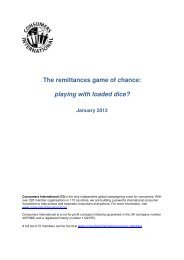Voices for Change: the Consumer Right to Representation
Voices for Change: the Consumer Right to Representation
Voices for Change: the Consumer Right to Representation
You also want an ePaper? Increase the reach of your titles
YUMPU automatically turns print PDFs into web optimized ePapers that Google loves.
50<br />
World <strong>Consumer</strong> <strong>Right</strong>s Day 2002: <strong>Voices</strong> <strong>for</strong> <strong>Change</strong><br />
Forbrukerrådet handles practically all complaints<br />
going <strong>to</strong> <strong>the</strong> public and voluntary committees.<br />
Not surprisingly, it receives an enormous<br />
quantity of material about consumer problems<br />
that it uses as a basis <strong>for</strong> planning its activities.<br />
Contact person: Finn T. Aas<br />
E-mail: Finn.aas@<strong>for</strong>brukerradet.no<br />
Senegal: Clear water bills<br />
As <strong>the</strong> consumers’ representative on <strong>the</strong><br />
watchdog body <strong>for</strong> Senegal’s private water<br />
company, <strong>the</strong> Association de Défense des<br />
usagers de l’Eau, de l’Electricité, des<br />
Télécommunications et Services (ADEETélS)<br />
spotted a serious inconsistency in billing<br />
arrangements. This error meant that all<br />
consumers were paying value-added tax (VAT)<br />
on <strong>the</strong>ir full water supply, despite agreements <strong>to</strong><br />
provide a sliding tax scale depending on<br />
consumption. ADEETelS used its access <strong>to</strong> <strong>the</strong><br />
moni<strong>to</strong>ring board <strong>to</strong> propose re<strong>for</strong>ms that<br />
eventually led <strong>to</strong> <strong>the</strong> bills being properly<br />
calculated with <strong>the</strong> tax exemption.<br />
Contact person: Dr Ahmadou Abdoulaye Aidara<br />
E-mail: adeetels@sen<strong>to</strong>o.sn<br />
Slovak Republic: Helping<br />
consumers query electricity bills<br />
In 1995 <strong>the</strong> Association of Slovak <strong>Consumer</strong>s<br />
(ASC) <strong>for</strong>med its own energy commission <strong>to</strong><br />
help consumers understand <strong>the</strong>ir electricity bills.<br />
ASC support <strong>to</strong>ok <strong>the</strong> <strong>for</strong>m of written<br />
presentations and recommendations <strong>to</strong> <strong>the</strong><br />
utilities company. Over <strong>the</strong> past five years,<br />
<strong>the</strong> number of cus<strong>to</strong>mer claims and complaints<br />
has fallen steadily. In addition, consumer<br />
representatives were asked <strong>to</strong> participate in <strong>the</strong><br />
tender selection committee <strong>for</strong> energy.<br />
Contact person: Zuzana Durianova<br />
E-mail: zss@zss.sk<br />
Sweden: Ethics of GM labelling<br />
The Swedish consumer group, Konsument-<br />
Forum has been active nationally on GM issues<br />
since 1995. Its ef<strong>for</strong>ts have convinced <strong>the</strong> food<br />
industry and <strong>the</strong> government <strong>to</strong> accept<br />
manda<strong>to</strong>ry labelling of all GM foods, including<br />
food oils and food additives. It has also argued<br />
successfully that antibiotic resistant marker<br />
genes are unacceptable <strong>to</strong> consumers – a position<br />
later adopted by <strong>the</strong> Swedish government. It<br />
holds that health or environmental risks are not<br />
<strong>the</strong> only legitimate consumer concerns; ethical<br />
and global concerns must also be taken in<strong>to</strong><br />
account in <strong>the</strong> GM debate. As a result of its<br />
activity at <strong>the</strong> national level, many of <strong>the</strong>se<br />
concerns are now included in <strong>the</strong> European<br />
Commission proposal <strong>for</strong> labelling and<br />
traceability of GM foods.<br />
Contact person: Martin Frid<br />
E-mail: konsument-<strong>for</strong>um@konsumentsamverkan.se<br />
Zambia: Fair electricity prices<br />
Prior <strong>to</strong> December 2000, <strong>the</strong> monopoly power<br />
company ZESCO used an Au<strong>to</strong>mated Tariff<br />
Adjustment <strong>for</strong>mula <strong>to</strong> set tariffs, taking in<strong>to</strong><br />
account <strong>the</strong> prevailing exchange rate. In practice,<br />
this meant that ZESCO raised prices twice a year.<br />
The Zambia <strong>Consumer</strong>s Association (ZACA)<br />
wrote <strong>to</strong> <strong>the</strong> Energy Regulation Board <strong>to</strong> advance<br />
consumers’ complaints. The board <strong>the</strong>n ruled<br />
that <strong>the</strong> au<strong>to</strong>mated tariff adjustment <strong>for</strong>mula be<br />
abolished, and that “all concerned parties meet<br />
later <strong>to</strong> determine ano<strong>the</strong>r method agreeable <strong>to</strong><br />
all parties”. As Muyunda Ililonga writes: “A<br />
public policy was changed, ZACA had made a<br />
mark and <strong>the</strong> consumers were happy!”<br />
Contact person: Muyunda Ililonga<br />
E-mail: zaca@zamnet.zm<br />
Zimbabwe: Protections in<br />
neo-liberal re<strong>for</strong>ms<br />
In <strong>the</strong> past decade, Zimbabwe has felt <strong>the</strong> impact<br />
of structural adjustment policies, which have<br />
removed price controls and subsidies. Active<br />
representation ef<strong>for</strong>ts by <strong>the</strong> <strong>Consumer</strong> Council<br />
of Zimbabwe (CCZ) have left <strong>the</strong> Zimbabwean<br />
consumer “better protected now than at <strong>the</strong><br />
inception of <strong>the</strong> new economic programmes,”<br />
writes Elizabeth Nerwande. CCZ is a member of<br />
<strong>the</strong> National Economic Consultative Forum, a<br />
multi-sec<strong>to</strong>r policy advisory <strong>for</strong>um <strong>to</strong> <strong>the</strong><br />
government. It is also a member of <strong>the</strong> Tripartite<br />
Negotiating Forum, with government, labour<br />
and business bodies, where it seeks <strong>to</strong> raise<br />
consumer protection policy as a mainstream<br />
issue. CCZ ef<strong>for</strong>ts include lobbying <strong>for</strong> <strong>the</strong><br />
introduction of a small claims court, a<br />
competition commission and legislation <strong>to</strong><br />
allow class action suits.<br />
Contact person: Elizabeth Nerwande<br />
E-mail: consumer@africaonline.co.zw


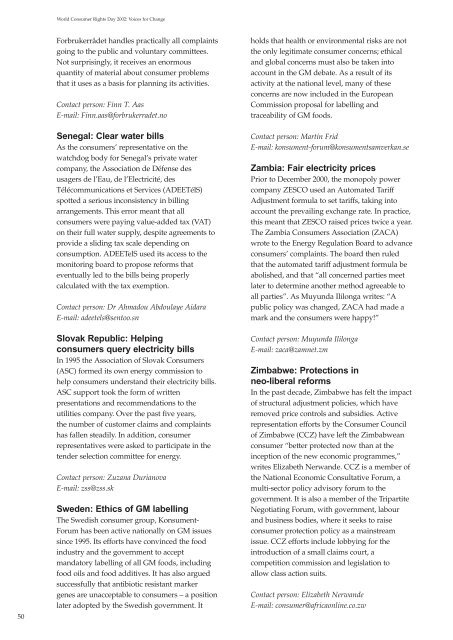
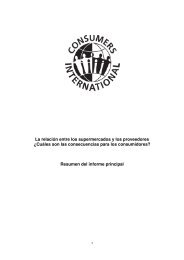
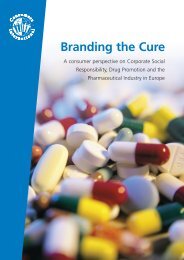
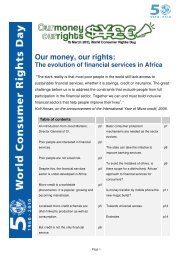
![pkef]Qmf eg]sf] s] xf] < - Consumers International](https://img.yumpu.com/6479658/1/184x260/pkefqmf-egsf-s-xf-consumers-international.jpg?quality=85)
